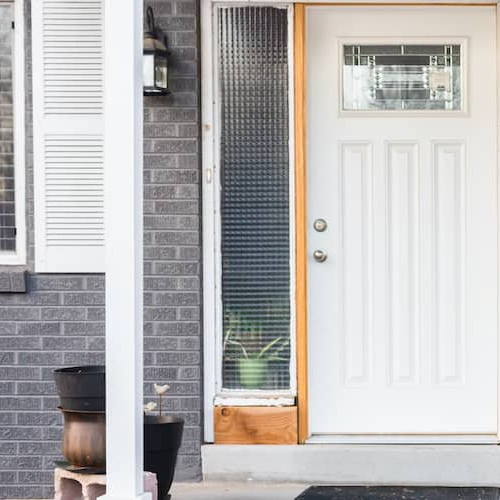Low housing inventory: How it affects the real estate market
Contributed by Tom McLean
Nov 15, 2025
•6-minute read

Supply and demand have a huge effect on the real estate market. The number of homes available in a market at any given time is called the housing inventory. A low housing inventory means there are not enough homes for sale to meet current buyer demand. If you’re a buyer, it means you’ll face more competition, and you can expect higher prices. If you’re selling, a low inventory means you can expect more bids and higher offers for your home.
What does low inventory mean in real estate?
When you have low inventory, real estate markets are tight. Inventory refers to how well supply meets demand for homes in a market. It’s often measured as the number of months it would take the current supply of housing to sell if no new homes were added to the market.
The current housing inventory is 3.3 months nationally, based on August 2025 data from Redfin®. That’s considered low housing inventory.
There’s no hard-and-fast rule for how many months of inventory is high or low.
Generally, 6 months’ worth of inventory is a balanced market. A month or two either way is considered neutral, depending on who you talk to. Beyond that, you get into high or low territory. Eight months of inventory would be considered high, while 4 months would be considered low.
Regardless of market size, fewer months of inventory indicate high demand, while more months of inventory suggest low demand. This is why months of supply is a housing market indicator.
It’s also worth noting that although you typically see months’ supply listed at a national level, what really matters in determining a buyer’s market or seller’s market is what’s happening in your area. Higher supply favors buyers, giving them more negotiating power. When supply is low, sellers can command higher prices.
What causes low housing inventory?
The causes of low housing inventory vary. Let’s touch on the big ones.
Economic factors
Economic factors play a significant role in housing demand. In general, demand for homes falls when unemployment is higher. People are more hesitant to buy if there’s any question about their income stability.
Another factor is mortgage rates. Although they are based in part on your personal qualifications, mortgage rates also are determined by market conditions.
Although accuracy is impossible, many people and organizations make housing market predictions. One inference you might make is that demand will increase if mortgage rates fall and decrease if rates rise.
Increased demand alone would only lead to lower inventory, but it might also decrease the lock-in effect that many housing economists theorize occurs when sellers who might otherwise want to move don’t because mortgage rates are higher than their current rate.
Investor purchases
Real estate investors buy homes as an investment property to turn a profit. This is accomplished either by renovating a fixer-upper home to increase its value and then selling it, or by renting the property to tenants.
The more properties investors buy, the fewer there are for the average home buyer. When competing with well-capitalized investors, you may need to pay a higher price to buy a home. On the other hand, if you’re a renter, this may mean more inventory available for you.
Fewer new-construction homes
Fewer homes being built also can restrict supply and reduce housing inventory. A few factors can limit the number of new-construction homes being built, including zoning restrictions and mortgage rates.
When builders seek to acquire land to build a house, they must comply with local ordinances, which can sometimes slow construction or make it more expensive.
Builders also consider their profit margins. They know they can potentially command higher prices when mortgage rates are lower, but there can be a delay because homes take a while to build.
Homeowner hesitancy
Homeowners usually won’t sell their home if they don’t have to. The question of whether they should sell the home comes down to a couple of factors.
Some prefer to stay in their homes as they age instead of downsizing. This can keep homes that otherwise would be available to younger buyers and house hunters off the market.
Other homeowners may choose to wait to sell, thinking prices may go up.
They also may hesitate to sell their home if current rates mean they’d pay more for a comparable new home. Even if they are willing to sell, finding a home they want to buy may be difficult due to low inventory.
The impact of low inventory on the housing market
The impact of low inventory on the housing market depends on your perspective.
Buyers
When inventory’s low, buyers can expect more competition – including possible bidding wars. You could face higher asking prices and a shorter home buying timeline amid competition from other bidders.
When you’re looking to buy a house, you may have to make compromises. For instance, still get the home inspection so you know what you’re getting into, but maybe you waive contingencies in a competitive market. Perhaps you rank your must-have features to understand what you can give up to stay on budget.
Sellers
If you’re a seller in a low-inventory market, you have the advantage. More competition generally means you can set a higher asking price and may benefit from a bidding war. If you're wondering why aren't houses selling right now, it may be because the inventory is high.
Those looking to buy a new home and sell their old one may find it more difficult. Bridge loans may be a good option.
Real estate investors
For real estate investors, low inventory is a mixed bag. If you want to offload some homes that you’ve flipped or jettison lower-performing rental properties, it could be good to do so while prices are high. On the other hand, if you’re looking to add to your real estate portfolio, it could be tough to find good deals.
How long will a housing shortage last?
The general rule used to be that 6 months of housing supply indicated a balanced market. Redfin data shows that at a national level, that hasn’t been the case since February 2012.
There are other important metrics to consider, such as days on market and whether home prices in your area have dropped. These can mean leverage for buyers.
To follow new construction in your market, try tracking listings on platforms like Redfin and upticks in building permits.
How to navigate a housing market with low inventory
Unless you work in the industry, most people probably think about real estate maybe once a decade when they buy or sell a house. Whether you’re a buyer or seller, that’s a strong argument for the professional representation of a real estate agent like those from our friends at Redfin.1
For buyers, one of the best things you can do is apply for mortgage preapproval so you know how much you can afford and can show sellers you’re ready to secure financing. Once you find a home you want to buy, your agent can help you make the best offer.
As a seller, your agent can help you market your home to potential buyers. They can conduct a comparative market analysis to ensure your price is competitive. You’ll want to keep your next living arrangement in mind if you haven’t yet bought your new place.
The bottom line: Housing inventory issues don’t have to derail your plans
Having low housing inventory – under 5 months of supply – can be challenging, but it’s easier to handle with the right preparation. Buyers should expect sellers to look for preapprovals. Sellers are usually buyers at the same time, so it’s important to have your next move in mind if you must find your new home.
You can do all the market research you want, but there’s no substitute for working with a professional. Your real estate agent can serve as a trusted guide.
Want to know how much you can afford? Get preapproved with Rocket Mortgage®.
1 Rocket Mortgage is an affiliate of Redfin. You aren’t required to use its lending services. Learn more at redfin.com/afba.
Rocket Mortgage, LLC, Rocket Homes Real Estate LLC, RockLoans Marketplace LLC (doing business as Rocket Loans), and Rocket Money, Inc., are separate operating subsidiaries of Rocket Limited Partnership. Redfin Corporation is an affiliated business of Rocket Limited Partnership. Each company is a separate legal entity operated and managed through its own management and governance structure. Rocket Limited Partnership is an indirect, wholly owned subsidiary of Rocket Companies, Inc. (NYSE: RKT).
Kevin Graham
Kevin Graham is a Senior Writer for Rocket. He specializes in mortgage qualification, economics and personal finance topics. Kevin has passed the MLO SAFE exam given to mortgage bankers and takes continuing education courses. As someone with cerebral palsy spastic quadriplegia that requires the use of a wheelchair, he also takes on articles around modifying your home for physical challenges and smart home tech. He has a BA in Journalism from Oakland University.
Related resources
10-minute read
Buyer's market vs. seller's market: What does each mean for you?
A buyer’s market helps buyers with lower prices and more choices, while a seller’s market helps sellers with more demand. Learn how each impacts you...
Read more

9-minute read
Home hunting tips: How to find a house
From getting a mortgage approval to viewing homes, the house shopping process involves several big steps. Get familiar with how to find a house here.
Read more

8-minute read
Bidding wars: 6 tips for home buyers on how to win
Preparation and planning are key when you’re making an offer on a hot property and a bidding war breaks out. Here are 6 tips to help your bid come out on ...
Read more